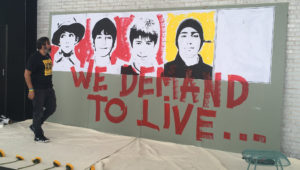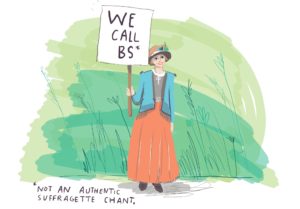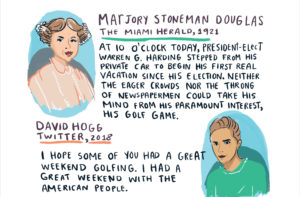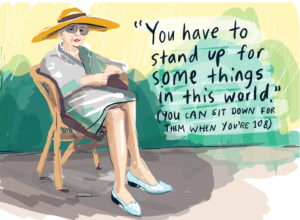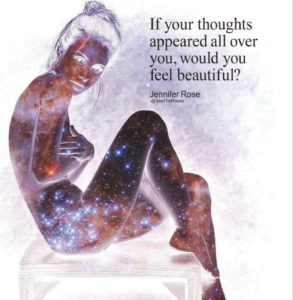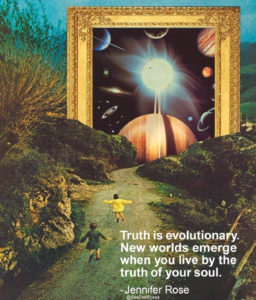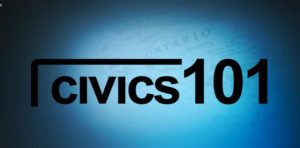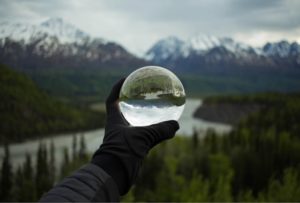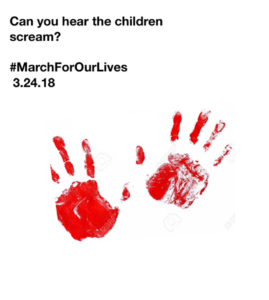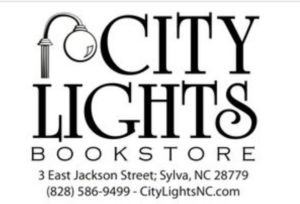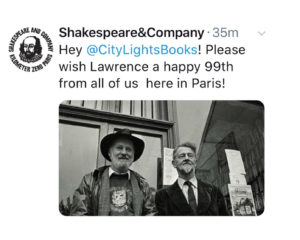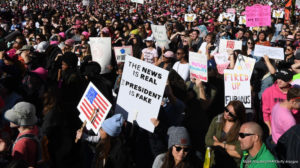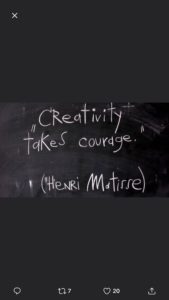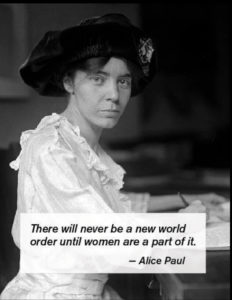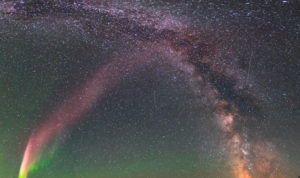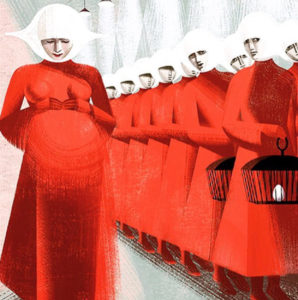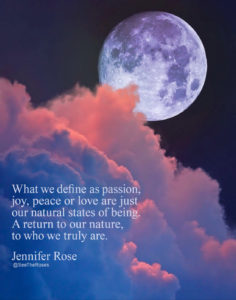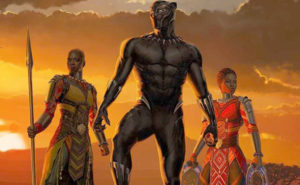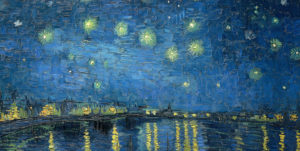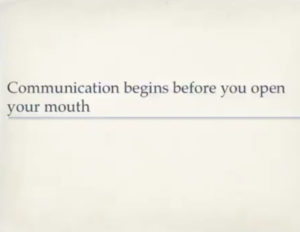Simple.
March 31, 2018BA to BS
In April 1917, Marjory Stoneman Douglas boarded a train in Miami with a bunch of other charismatic suffragettes. Their destination was the state capital, Tallahassee, where they would eloquently make the case for women’s right to vote. “We could have been talking to a bunch of dead mackerel, for all the response we got,” said Douglas. She had little respect for the “wool-hat boys,” the condescending, small-minded boors who were the state representatives. The women’s entreaties fell on stupid ears, and Marjory Stoneman Douglas would later remark that she was speaking “over the heads of the audience, to a future generation.”
That generation is here.
- Activist
- Journalist
- Author
- Suffragette
- Humanist
YES! Magazine
[full illustrated essay at http://www.yesmagazine.org/peace-justice/what-the-real-marjory-stoneman-douglas-would-do-20180329
The 5%.
“Your friendly reminder that dark matter comprises 25 percent of the mass energy budget of the cosmos, while dark energy comprise 70 percent, and the normal matter that you and I are made of is just a wee 5 percent. And it’s all connected by a cosmic web of filamentary bridges that stretch across millions of lightyears. Carry on.”
Natalie Batalha, NASA Astrophysicist
..•*¨`*.• ´*.¸.•
March 30, 2018✿
March 27, 2018‘Civic Participation & Democracy are Synonymous’
Civic Participation Begins in Schools
Stanford Social Innovation Review
Fostering a robust democracy in America requires that we create a truly democratic school culture.
‘Generations of young people growing up in the United States have witnessed a sustained institutional disregard for equal rights, freedom of speech, voting rights, and access to decent housing. Young people in this era are particularly disillusioned about a democracy in which Twitter wars at the federal level become an acceptable substitute for dialogue and debate about substantive matters.
Many schools have failed to prepare our youngest citizens to become stewards of democracy, possessing the knowledge and skills required for active and engaged citizenship. Statistics demonstrating this failure are plentiful: Only one-third of Americans can name all branches of government, and one-third cannot name any at all. 37 percent of Americans cannot name any of the rights guaranteed in the first amendment. And perhaps the most worrisome statistic: Only 33 percent of Americans born after 1980 consider democracy essential, while 24 percent of young people consider democracy a bad way to govern a country.
Today’s nationwide toxic environment provides an impetus for articulating a more inspiring and citizen-centric vision for our public schools. This new vision includes re-imagining schools as laboratories of democracy, enlisting young people as co-collaborators with educators and local community members as partners in constructing the democracy our country both needs and deserves. Rather than exhorting young people to understand a staid conceptualization of democracy that reduces their own agency in the ever-changing American narrative, there is an opportunity for schools to engage our youth as legitimate political actors who can help us re-envision the very practice and values associated with democracy.
We can transform schools into beacons of democracy by ensuring that schools focus on centering education in the communities in which they are located, by constructing classes that are relevant to students’ lives, and by creating a democratic culture within school walls.
The process begins with a greater respect for the community in which school are situated. Students need to understand that the community is a place where citizens make their wants and needs known, and work together to solve communal challenges. Community members need to see the success of young people as relevant to the success of the community. Elected officials can learn to recognize students as purveyors of important local civic knowledge, capable of informing the most complex policy debates. Young people have a place in the community’s discourse and action, and it is important for them to experience the messiness and the satisfaction alike of the democratic process.
Our democracy may indeed be at risk, but an appreciation for our unprecedented times opens up unprecedented possibilities. A foundational reorientation of the purpose of public education can enable our youngest generation to not only understand democracy but also participate in creating a better version of it. We may have not yet created a democracy stable enough for future generations. But young people can help to create a better one.‘
[full article: https://ssir.org/articles/entry/civic_participation_begins_in_schools]
Sylvia Rousseau & Scott Warren
Care & Action
March 26, 2018”…it’s about caring for our shared world, lest we let it sleep away through inattention and neglect. […] The active threats to that world have multiplied many times over. There’s a new urgency about paying attention and responding to what we see. The Powers that Be are intent on ‘disappearing’ so much that million of Americans care about—pristine wilderness, clean air and water, affordable health care for all, the social safety net, and mutual respect in the midst of diversity.”
Parker Palmer/On Being
What can a person do to help bring back the world?
We have to watch it and then look at a each other.
Together we hold it close and carefully save it, like a bubble that can disappear
if we don’t watch out.
-William Stafford
[full article: https://onbeing.org/blog/parker-palmer-to-watch-the-world-and-then-each-other]
_______
Reclaiming this nation starts with reclaiming our attention.
The next time you open up the newspaper or sit down in front of your computer or open an app on your phone to inform yourself about the day’s news, take a moment to set an intention of reading majority non-DT-related news. If you do read a piece related to him, attempt to privilege the information that is about his actions, not his style. When you are in a conversation with someone and it veers down the path of deconstructing something DT has said, intentionally steer it away. Take something you learned while de-prioritizing him and offer it up to your conversation partner. Be part of the solution — highlighting the world around us that has been deeply and poisonously overshadowed by the political climate of the last year and more.
Media obviously has a role to play here, but so do all of us. Our consumption patterns determine what media producers focus on during the next cycle. What we talk about with our friends, neighbors, families all contribute to either feeding or starving this obsession with big politics, as opposed to science, art, our communities, and so much more.
I’m not advocating for disengagement. There’s never been a more important time, at least in my lifespan, for citizens to lean in hard to our duty — to be aware, to be awake, to take action. But obsessing over tweets doesn’t count as civic duty. It’s rubbernecking, not awareness building, and it’s making us feel more disconnected than ever before. Reclaiming this nation starts with reclaiming our attention, our daily media practices, our everyday conversations.”
-Courtney Martin, Columnist
R.E.V.
’And a little child shall lead them.’
Isaiah 11:6
https://mobile.twitter.com/AMarch4OurLives/status/978256128873086977/video/1
R E G I S T E R E D U C A T E V O T E
Literary Locus
March 22, 2018Lawrence Ferlinghetti (age 99) and a chat with the San Francisco Chronicle
Q: What’s the last poem you wrote?
A: It was published in the Nation magazine. It’s called “Trump’s Trojan Horse”: “Homer didn’t live long enough/ To tell of Trump’s Trojan Horse/ From which all the president’s men/ Burst out in the White House to destroy democracy/ And institute absolute rule by corporations/ Bow down, oh Common Man/ Bow down!”
Ferlinghetti’s activist voice has not softened. When speaking about President Trump, he is unequivocal: “Trump is an evil man,” he says. “He’s so dangerous. I think you’ve got to take this man seriously. I think he’s out to destroy democracy.”
Q: Why San Francisco?
A: The first thing I realized, there was no bookstore to become the locus for the literary community. It’s really important if you’re going to have a literary community, it has to have a locus. It just can’t be out there in the air. So, from the very beginning, when we started City Lights in June 1953, the idea was to make it a locus for the new literary community that had developed out of the Berkeley Renaissance, so called, and it proved to be true. People just flocked to it because there had been no locus for the literary life.
[full article: https://www.sfchronicle.com/books/amp/Ferlinghetti-speaks-out-at-99-his-voice-as-vital-12764802.php?__twitter_impression=true
(This makes me so happy.)
March 21, 2018The Rise of ‘Fake News’ is Producing a Record Number of Journalism Majors
Applications have jumped at journalism schools across the country. After five years of “consistent” application numbers, Columbia University’s Graduate School of Journalism saw a 10% increase for the 2017-2018 school year, a spokeswoman said.
News organizations including The New York Times and The Washington Post have said they’ve seen spikes in subscriptions since President Donald Trump’s election.
The Wall Street Journal, which is owned by MarketWatch’s parent company News Corp. NWSA+0.92% has also added subscribers, now totaling more than 2.2 million, including print editions. The Journal added 118,000 digital subscribers between December 2016 and March 2017.
Full article: https://www.marketwatch.com/amp/story/guid/44CA6978-2951-11E8-B849-1F206CEB17F4?__twitter_impression=true
“…those giving more.”
“With all the abundance we are receiving, there coms a time when we are called to give it away. It’s like breathing—you can only inhale for along.
Giving creates the space for receiving.
And giving creates within us a sense that we are doing our part. It says we are one with the whole.
We are all here to serve each other.
The happiest people are not those getting more, but those giving more. [H. Jackson Brown Jr.]
Give from the abundance and courage of your heart.”
And be creative.
-Science of Mind
“The Power of Citizenship”
March 19, 2018ASPEN INSTITUTE
“What do you think Americans should know to be civically and culturally literate?”
Lesson’s from the Women’s Suffrage Movement
No matter what one’s political leanings, everyone can learn from the history of the women’s suffrage movement.
Although (Alice) Paul may not be as well-known as Susan B. Anthony, Eleanor Roosevelt or Martin Luther King, Jr., all owe her a debt as her tactics of civil disobedience would become the tools of the push for Civil Rights and other movements. Her championing of equal rights would help shape the United Nations Charter, alongside the efforts of Eleanor Roosevelt. And Paul’s leadership also helped establish the permanent UN Commission on the Status of Women.
Alice Paul had cut her teeth in England, learning from activists how to get people’s attention for women’s rights by staging parades, street meetings, and protests, which led to her arrest and imprisonment. She put these lessons to work in the US, too. President Woodrow Wilson was appalled by Paul and her “unladylike” tactics, which she used in her public protests for women’s voting rights outside the White House and elsewhere in Washington.
In the same year, Paul spent seven months in prison for her civil disobedience, but she was not alone. Of her fellow demonstrators, about 500 were arrested, and 168 served prison sentences for their participation. While in jail, Paul led a hunger strike and was force-fed along with other women of the NWP, who demanded to be considered political prisoners rather than criminals.
Although they had sometimes been beaten by bystanders outside the White House, and called unpatriotic and worse during World War I, the NWP still fueled general outrage in the press and public. Under pressure from growing public support for women’s suffrage, Wilson finally relented in his opposition and offered his backing for an amendment. The Senate subsequently passed the Susan B. Anthony Amendment for equal suffrage on June 4, 1919.
The 19th Amendment to the US Constitution was ratified by the required three-fourths of the states and became law just before the 1920 election.
[full article: https://www.aspeninstitute.org/blog-posts/lessons-womens-suffrage-movement/]
..•*¨` ´*.¸.• .¸. .¸.¸¸
March 18, 2018Y
O
U
are a blessed piece of spirit dust in spirit wind.
[Photo: Krista Tinder/Science Friday]
Meanwhile, in Idaho…
Michelle Stennett
Idaho State Senate Minority Leader
Legislative News
—
‘Tracking Women’
Michelle writes, “After nearly three hours of debate, the Senate voted in favor of a measure that creates reporting requirements for complications that may have resulted from a pregnancy termination. The measure includes making linkages between terminations and 40 other medical conditions that may be experienced by a woman over the course of her life. The listed conditions include health complications that are seen in both men and women including comas, heart attacks, and strokes. Additionally, physicians who fail to comply with these reporting requirements face stiff fines and potential loss of license. Those who debated against the measure see it as a tremendous act of government overreach, <especially considering that no other surgical procedure in the state has similar reporting requirements.> These include a woman’s race, age, number of children she’s birthed that have lived, and number who have died. The bill would create an incredible expense for the Department of Health and Welfare, and ultimately taxpayers, to implement. I signed onto a bipartisan letter asking Governor Otter to veto the measure.”
#
✿
March 17, 2018Black Panther
5 Lessons From Black Panther That Can Save Our Lives and Transform Politics
by Frank Leon Roberts, New York University
[MEDIUM]
1) Radical Collectivity and Revolutionary Empathy
2) Intergenerational Wisdom
3) Resotrative Justice
4) The Women Shall Lead The Way
5) The Ancestors Are Always With Us
Full Article:
‘…the ‘whole-making spirit.’
☆The life pouring through us, pumping our heart and breathing through our lungs, did not begin at our birth or conception. Like every particle in every atom and molecule of our bodies, it goes back through time to the first splitting and spinning of the stars. —Joanna Macy
☆Our inner spiritual world cannot be activated without experience of the outer world of wonder for the mind, beauty for the imagination, and intimacy for the emotions. —Thomas Berry
Viriditas
Richard Rohr:
Long ago, St. Hildegard of Bingen (1098-1179), named a Doctor of the Church in 2012, communicated creation spirituality through music, art, poetry, medicine, gardening, and reflections on nature. She wrote in her famous book, Scivias:
You understand so little of what is around you because you do not use what is within you.
This is key to understanding Hildegard and is very similar to Teresa of Ávila’s understanding of the soul. Without using the word, Hildegard recognized that the human person is a microcosm with a natural affinity for or resonance with its macrocosm, which many call God. Our little world reflects the big world. The key word here is resonance. Contemplative prayer allows your mind to resonate with what is visible and right in front of you. Contemplation erases the separateness between the seer and the seen.
Hildegard often used the word viriditas, the greening of things from within, similar to what we now call photosynthesis. She recognized a readiness in plants to receive the sun and to transform it into energy and life. She also saw an inherent connection between the physical world and the divine Presence. This connection translates into energy that is the soul and seed of everything, an inner voice calling you to “Become who you are; become all that you are.” This is our “life wish” or what Carl Jung called the “whole-making spirit.”
Hildegard is a wonderful example of someone who lives safely inside an entire cosmology, a universe where the inner shows itself in the outer, and the outer reflects the inner, where the individual reflects the cosmos, and the cosmos reflects the individual. Hildegard said, “O Holy Spirit, you are the mighty way in which every thing that is in the heavens, on the earth, and under the earth, is penetrated with connectedness, penetrated with relatedness.” [2] It is truly a Trinitarian universe, with all things whirling toward one another: from orbits, to gravity, to ecosystems, to sexuality.
Indeed, for Hildegard nature was a mirror for the soul and for God. This mirroring changes how we see and experience reality. Later, Bonaventure (1217-1274) wrote: “In the soul’s journey to God we must present to ourselves the whole material world as the first mirror through which we may pass over to the Supreme. “ The Dominican Meister Eckhart (1260-1327) said the same: “If humankind could have known God without the world, God would never have created the world.” [5]
Nature is not a mere scenic backdrop so humans can take over the stage. Creation is in fact a full participant in human transformation, since the outer world is absolutely needed to mirror the true inner world. There are not just two sacraments, or even seven; the whole world is a sacrament.
[Meister Eckhart, The Complete Mystical Works of Meister Eckhart, ed. Maurice O’Connell Walshe, rev. Bernard McGinn (New York: The Crossroad Publishing Company, 2009), 275.]
When we look down on the Earth from space, we see this amazing, indescribably beautiful planet. It looks like a living, breathing organism. But it also at the same time, looks extremely fragile.—Ron Garan, NASA Astronaut
I have set before you life and death, therefore choose life. —Deuteronomy 30:19
